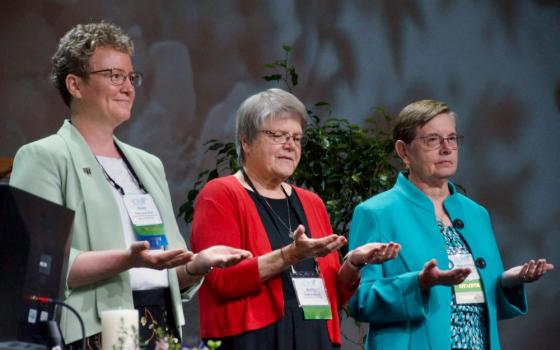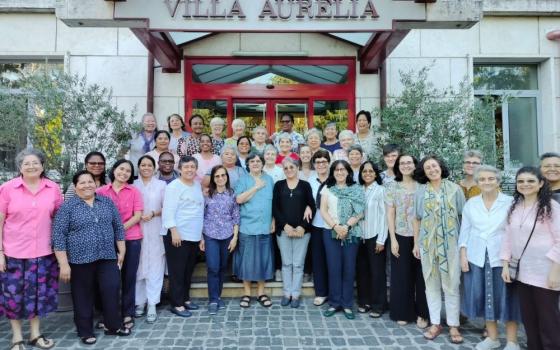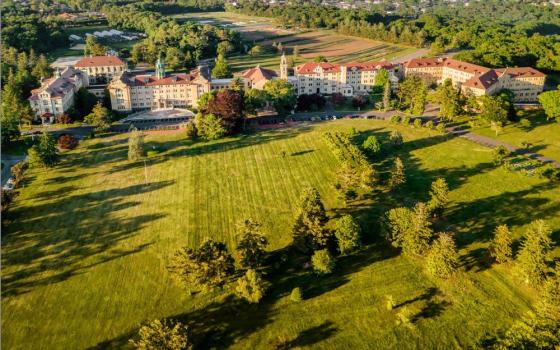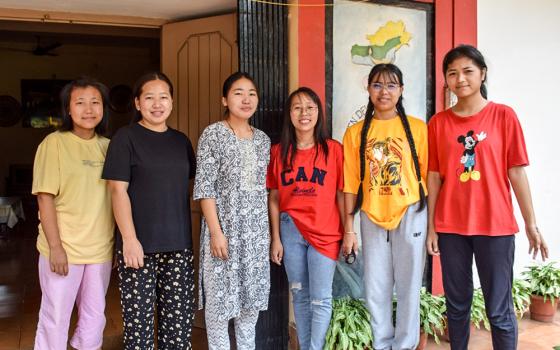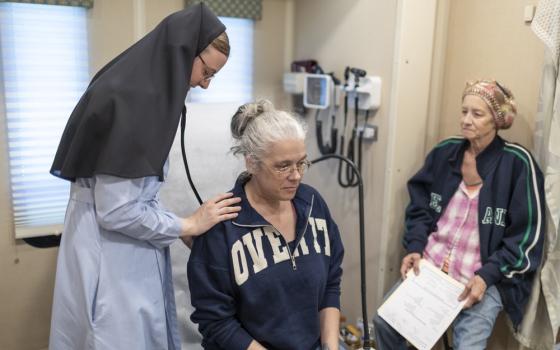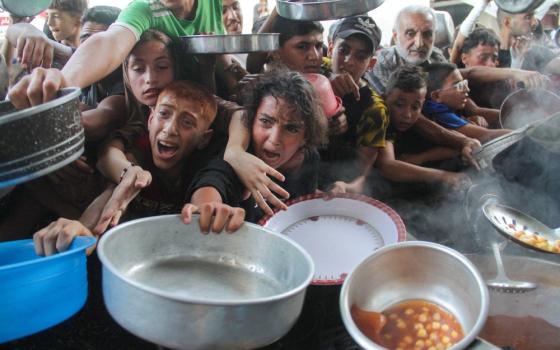Sr. Ianire Angulo Ordorika of the Handmaids of Most Holy Eucharist and the Mother of God speaks at an Oct. 21 lecture at the Pontifical University of Salamanca's Madrid campus. (Courtesy of the Theological Institute of Religious Life)
Sr. Ianire Angulo Ordorika is passionate not only about theology itself, but also sharing it. She is a professor of theology at Loyola University Andalusia in Granada, Spain, and a guest lecturer with the Theological Institute of Religious Life at the Pontifical University of Salamanca (Madrid campus).
She grew up in northern Spain and attended schools run by the Handmaids of Most Holy Eucharist and the Mother of God. When she felt called to religious life, she said she chose to join the Handmaids because the community devotes itself to evangelization through education, and she made her final vows in 2002. The congregation also has a strong contemplative component: Sisters take a fourth vow of devotion to the adoration of the Blessed Sacrament, which is important to her. Her congregation mostly runs schools; she is one of the few members who works outside its sponsored ministries.
"By my nature, I need to understand," she said. "It was this need to understand that led me to become passionate about the theological world from the beginning of my formation in consecrated life: understanding what I believe in, who is the God in whom I trust and has helped me to grow as a person and as a believer."
It was not easy to study theology, since it was not the norm in her congregation, she said, but she earned a bachelor's degree in theology and licentiates in two specialty areas: theology of religious life at the Pontifical University of Salamanca and sacred Scripture at the Comillas Pontifical University in Madrid. She earned her doctorate in sacred Scripture from Comillas Pontifical University in 2018.
In October, she published a paper on abuse of power in religious life, "La Presencia Innombrada: Abuso de Poder en la Vida Consagrada" ("The Unnamed Presence: Abuse of Power in Consecrated Life") in the Spanish-language journal Teología y Vida (Theology and Life), a publication of the Pontifical Catholic University of Chile. The International Union of Superiors General will host a two-part course March 21-22 based on her paper. (The course is sponsored by the Conrad N. Hilton Foundation, which is the major funder of Global Sisters Report.)
GSR: How and why did you decide to do this paper?
Angulo Ordorika: I came to the subject of abuse in two different ways.
First, I accompanied sisters from various religious institutes who had suffered sexual abuse. Some had suffered abuse as children, some had suffered abuse as adults and some as religious. It was primarily a ministry of listening and spiritual direction. I was teaching courses, giving spiritual exercises, and sisters would want to talk a little more. This gave me not only a very experiential knowledge of the victims, their personal and institutional difficulties and the consequences of abuse, but also a special sensitivity to this issue in the midst of the global abuse crisis the church is experiencing.
Second, while I was learning about this issue on my own and motivated by a very personal concern stemming from the confidences of the sisters, the Jesuit province to which the Loyola University Andalusia belongs, asked all the university centers of the Society of Jesus in Spain to carry out a joint investigation on abuse as a structural reality in the church.
We have been working as a team for two years. This team includes professors and experts from different disciplines — experts in psychology, canon law, theology, Scripture, religious life, etc. — and together, we are trying to make a theological reflection on this subject in order bring awareness.
There, I became increasingly aware that abuses are the expression of a problem in the management of power and leadership. I realized there was something specific that was not being asked or talked about. So in listening to victims of sexual abuse and other types of abuse of female consecrated life, I wanted to go deep into the study of this.
This reflection is not the fruit of the work of the team. The field is very broad, and the research group studies many issues. Because of my formation and experience of listening to sisters from different institutes, I chose to study the complex reality of abuses of power and conscience in female consecrated life.
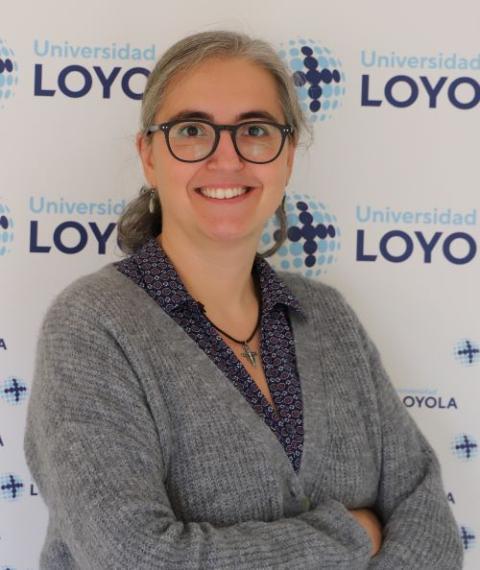
Sr. Ianire Angulo Ordorika of the Handmaids of Most Holy Eucharist and the Mother of God (Courtesy of Loyola Andalucía University)
What has been the reaction to it?
I have been surprised by the reception my reflection has had. Although all the issues that have to do with abusive situations awaken many defense mechanisms, on several occasions, I have felt that many sisters, being victims or witnesses of these situations, have expressed that this is an issue we need to address.
Why do you think the issue of abuse of power and conscience has been neglected in women's congregations? Is it related to gender?
I believe it has been neglected in all ecclesial institutions, both male and female. The most notorious difference has to do with the way in which men and women relate to power.
The behavioral model that for both cultural and historical reasons we women have conformed to denies the desire for power that is inherent in every human being. This makes it take on more discreet and less evident forms, closer to manipulation.
Something similar happens in the way boys and girls bully in schools. Boys are likely to be more violent or more obvious, but girls manipulate in a different, more subtle way.
If we add to this the religious discourse, which allows greater manipulation in the name of obedience, humility and asceticism, we have an explosive combination.
Why is the issue of abuse of power in women's congregations now surfacing?
It is beginning to come to light timidly, not in a widespread way. I think it has to do with a greater sensitivity to sexual abuse and, above all, because we are increasingly aware that sexual abuse is an extreme expression of an abuse of power. The pope has recognized this on various occasions when he speaks of clericalism as the root cause of abuse or when he stresses the need to reflect on synodality in the church. Clericalism does not only concern clerics, but is a way of perceiving the hierarchy and the predominant power in the church that easily provokes abusive situations. Women are not free from it and, moreover, we are more subtle when it comes to creating these situations.
Advertisement
Do you have any suggestions about how to address the data gap on abuse of sisters by clergy or within their own congregations, whether sexual or non-sexual? You say in your paper, "It is unlikely that the problem of sexual abuse of nuns will come to light to its true extent, even though some voices have already warned about it." Why is this?
Victims do not speak when they want to, but when they can. They speak only when they have gone through a psychological process that allows them to verbalize what has happened to them. The same thing happens with abuse suffered during childhood: Victims do not denounce their abusers until much later.
That is why some states and many places are trying to change the laws so that the statute of limitations does not expire and victims have a chance to denounce their abusers. Many times, they aren't able to recognize what happened to them because of the psychological defense mechanisms in themselves.
In the case of sexual abuse, we must also take into account the constant revictimization suffered by those who have been abused. There is always a suspicion because it is usually assumed that between adults, if there is no explicit violence, it must be considered a consensual practice. This assumes a great ignorance of how abuse occurs and how the power of asymmetrical relationships is capable of manipulating the victims.
In addition to the characteristic guilt of every victim of abuse, there is this permanent suspicion, often expressed, which makes them feel judged and implies a double victimization. When they finally get the courage to speak out, the reaction of other people can make them feel like a victim again. The penal, civil and canonical process is made in such a way that it makes the person a victim one more time. Most of our congregations are not prepared to welcome the victims in their midst, which makes it preferable for them to remain silent than to suffer a new victimization.
Not only our congregations, but also the ecclesial processes are not prepared to deal with sexual abuse committed against adults. The canonical processes are always under the suspicion that it is a "consensual sin" and not a crime. Awareness has to be much greater to be able to deal with these situations, and canon law has a lot of work to do to develop processes and humanize them so that victims are not, in addition, judged by a group of male clerics.
You explore living out the vow of obedience and how it is bringing awareness of abuse and potential abuse of power in religious life. You cite that the reality of abuse of power "should encourage a theological reflection on this vocation... [and rethinking] the practical way of living this vow as well as of making institutional decisions." What ideas do you have of practical ways to rethink the vow of obedience and decision-making in congregations?
This is a question that should give rise to much reflection. The theology of consecrated life must be reconsidered in the light of all these situations. I mention only a couple of issues that need to be revisited.
In the first place: the understanding of the vow of obedience and the role of superiors. Superiors are responsible for the external forum; that is, for making decisions that are necessary so that the environment of the community can nurture the vocational experience of each of its members. This external responsibility should never be mixed with the internal forum, or conscience of members.
Frequently, a certain spiritualization of the responsibility of superiors "who take the place of God," as the Code of Canon Law affirms, causes these functions to be mixed, granting them an authority of spiritual guidance or discernment that goes far beyond their function. There are constitutions and rules of life of institutes that, for example, establish an "account of conscience" or "account of prayer" in which each religious discusses her internal forum with her superior, which can lead to abuse. It also goes against Canon 630, which recognizes the due freedom of each member regarding the direction of her conscience, which says a superior cannot force members to reveal their conscience to them.
It is necessary to rethink what the vow of obedience entails because when it is lived in this way, it hijacks the individual's capacity for discernment. We also have to rethink the role of the superior. One cannot assign them, as a task, a greater capacity of discernment.
Sr. Ianire Angulo Ordorika of the Handmaids of Most Holy Eucharist and the Mother of God at an Oct. 21 lecture at the Pontifical University of Salamanca's Madrid campus (Courtesy of the Theological Institute of Religious Life)
How does that work with reporting? If I've been abused and I don't want to talk with my superior about it, how does abuse of any kind get reported?
There isn't a protocol or canonical process established, and the practices I've heard of involves the sister that denounces [an abuser] transferring to another province. Abuse of conscience and power is not easy to prove because you're going against someone who always has authority.
One of the repeating patterns of someone who abuses is that their behavior of abuse is unexpected. People who abuse don't usually project the image of an abuser. The biggest abusers were really charismatic people, and that takes credibility away from victims who denounce them.
This leads me to point No. 2. It is important that the systems of control suggested by canon law be truly effective. The time limit on responsibilities [of superiors] and the obligation of councils is intended precisely to avoid excesses.
The function of a council is to provide another voice to the opinion of the superior, and it is important that councilors speak so that there is a balance in the discussion. Oftentimes, councils are not critical and are built to agree with the voice of the superior. Superiors also have a certain time limit according to canon law, but there are a thousand ways to fool the system. They go to another community and become a vicar and then return to become a superior again, so you can have the same person for a long time being the one in charge.
What responsibility and recourse do members have if they recognize or experience abuse of power or other forms of abuse in their congregation, particularly if it involves the leader?
I am afraid we have all the responsibility but no way to appeal. As of today, the resources offered by canon law are practically nonexistent. It is urgent to generate effective processes that offer tools to stop abusive situations. Unfortunately, the current practice is either to adapt to the situation and accept it without further ado or to confront it. The consequence of the latter usually entails the victim leaving the institute [or congregation], changing monasteries or changing provinces. Once again, it is the victims who suffer the most even when situations are denounced.
How do these studies of abuse get disseminated? How will they make a difference?
The theological reflection is important because of the need to first understand it and bring it a name. Once you can give it a name, you can bring awareness to the situation. There are many people who are suffering this reality but don't really understand what is happening. That is why theological reflection comes first, then the awareness and giving it a name comes next.
There are no canonical processes because there hasn't been a demand for them. When there is a demand, the canonical processes will follow. Perhaps we will be able to read our rules of life, our constitutions in light of this awareness. Awareness is the most important thing, and the UISG course is a very important step to bringing awareness to this topic.
Editor's note: This interview was conducted in Spanish and translated by Sr. Helga Leija, a trained and experienced translator and a sister in transition to the Benedictine Sisters of Mount St. Scholastica in Atchison, Kansas. More information about the course that Sr. Ianire Angulo Ordorika is presenting on "Speaking what is unspoken: What is conducive to abuses of power and conscience in Consecrated Life" through the International Union of Superiors General on March 21-22 is available here.


